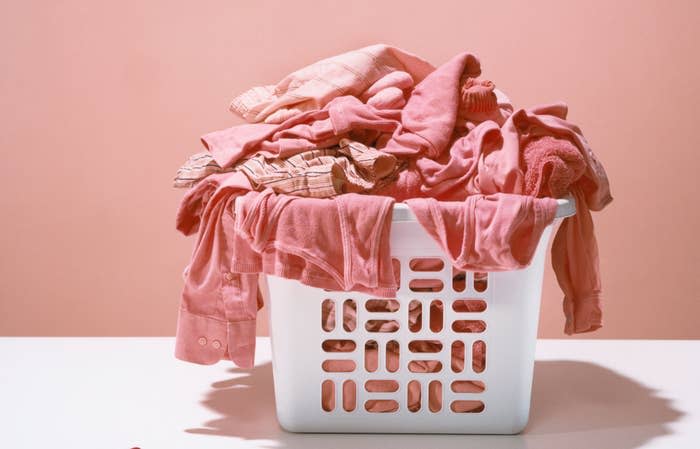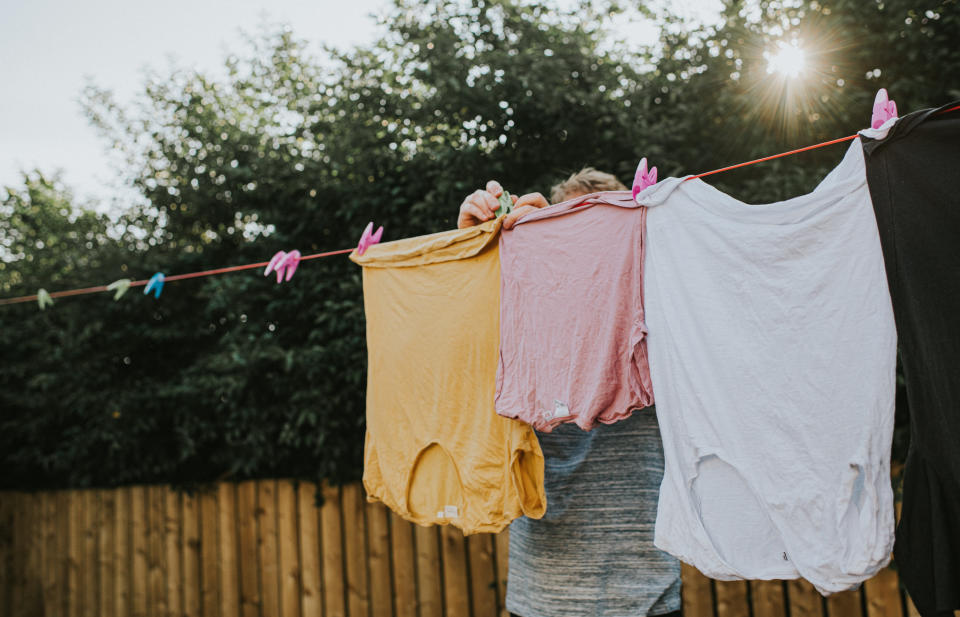You Can Wear Your Jeans 10 Times Before They Need To Be Washed And More Surprising Facts About Doing Your Laundry

If you reflexively throw your clothes in the hamper after every wear, it may be time to rethink your laundry habits.
There are no hard-and-fast rules when it comes to how often to wash or rewear an article of clothing — it’s really a personal choice, said Carolyn Forte, executive director of the Good Housekeeping Institute’s Home Care and Cleaning Lab.
“But I suspect most people probably wash — or even dry clean — their clothing more often than needed,” she told HuffPost. “Americans do a lot of laundry and tend to put many things in the wash after a wear or two.”
Not only can laundering your clothes too frequently decrease the longevity of the garment, it also has a significant impact on the environment.
The average American household does about 300 loads of laundry a year. A single load can use anywhere from 7 to 25 gallons of water, depending on the machine (older models use even more). Washing your clothes in hot water increases energy usage, and using the dryer — instead of air drying — is a big energy guzzler, too. And don’t get us started on dryer sheets.
At the same time, it’s important not to wait too long between washes, as that may lead to some potential skin issues, yeast infections and odor problems.
″Sweat, oils, dead skin cells and microorganisms like bacteria or fungi can be transferred over to clothing,” dermatologist Dr. Joshua Zeichner, associate professor of dermatology at Mount Sinai Hospital in New York City, told HuffPost. “As the soiled garment sits, it gives microorganisms time to grow and multiply. These microorganisms can grow on the garment and be transferred back to your body if you wear it again.”
One example: Rewearing sweaty socks can cause athlete’s foot or worsen an existing case, Zeichner said.
Dr. Aanand Geria, a dermatologist at Geria Dermatology in Verona, New Jersey, said not washing your clothes often enough can also lead to folliculitis and acne flare-ups.
“Dirty clothes can trap oil, dead skin cells and other debris against the skin, leading to clogged pores and acne breakouts,” he told HuffPost. “The bacteria and sweat accumulating on unwashed clothes can also cause a foul odor that can be difficult to remove, even after washing.”
But some articles of clothing don’t need to be laundered as often as others. We talked to experts to find out which items should be washed every time, which can be reworn and which other factors should be taken into consideration.
What To Wash After Every Wear
One rule of thumb from Zeichner: “Generally speaking, the closer a garment is to your skin, the more often it should be washed,” he said. “Intimates that are exposed to heavy sweat or potential body soils should be washed daily. ”
That includes things like underwear, socks, undershirts and workout clothes, Forte said. But if you didn’t break a sweat in your activewear, you can probably get away with rewearing it — just let the pieces air out in between.
And anything else that is visibly dirty, stained or has an odor can be thrown in the laundry, cleaning expert Becky Rapinchuk — the woman behind Clean Mama — told HuffPost.
What To Wash Every Few Wears
Clothing that comes into contact with your skin but isn’t sweaty or soiled can be worn a second time without washing, Zeichner said.
Pants, sweaters, blouses, bras and pajamas can “usually be worn a few times before washing,” Forte said. “Especially if they’ve been worn for a short period of time without any sweating or soil.”
If you’re just hanging around the house or work from home and don’t perspire much, you can probably wear your clothes three or four times before washing them, Miami dermatologist Dr. Annie Gonzalez previously told Brightly.
Jeans can also be worn at least a few times before washing. In fact, “They’ll last longer and generally look better when softened up with wear,” Rapinchuk said. And some experts say you can wait 10 wears or more between washes.
One caveat: If you’re someone who doesn’t wear underwear, you should wash your pants or leggings before wearing them again due to the direct contact with your genitals, New York City dermatologist Anthony Rossi previously told CNN.
What You Can Wash Less Frequently
Clothing that doesn’t make close, sustained contact with the body doesn’t need to be washed all that often.
“Outerwear like coats, jackets and items worn over other clothing, like bathrobes and sweaters, can go longer between washes as they tend to be worn for shorter periods of time,” Forte said.
The same goes for the dressier pieces in your closet that you may only wear occasionally.
Things like “suits, evening gowns, and cocktail dresses are typically made of delicate fabrics that require special care,” Geria said. “They can often be worn multiple times before cleaning, especially if they are not heavily soiled or stained.”
But if you really worked up a sweat — like, say, dancing the night away at an outdoor wedding — then you may choose to hand wash or dry clean the garment before wearing it again.
How To Keep Clothes Fresh Between Washes

Planning to rewear items a few times before tossing them in the laundry? Here are some expert-backed tips and tricks to keep in mind.
Between wears, don’t just tuck the garment away in a drawer or the back of your closet. Hang it somewhere more open or even outdoors, if you have the space to do so. You can also use a garment steamer or spray the item with a product like Febreze Clothing Odor Eliminator, Forte suggested.
Rapinchuk recommends briefly throwing an outfit that needs a little refresh in a warm dryer with a damp washcloth or towel.
“Give it 15 minutes or so to tumble and hang it back up to wear again!” she said.
To extend the time between washes, you can also try spot-cleaning stains or hanging a garment in the bathroom while you shower as another way of steaming it, sustainable fashion expert Orsola de Castro previously told The Guardian.
For denim that needs a refresh, some people swear by sticking their jeans in the freezer overnight. It won’t kill most bacteria, as some have claimed ― but if it makes the jeans feel cleaner to you, then we won’t stop you. This post originally appeared on HuffPost.


